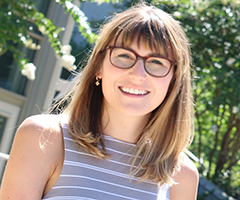Kristin Nelson

From monastery archival work to parasitic disease studies in sub-Saharan Africa, the research interests of Laney Graduate School students lead them to nearly every corner of the globe. But what shapes their journeys at Laney?
We recently caught up with 4th year Epidemiology doctoral student Kristin Nelson to learn more about her research and the mentoring support that has helped to shape her success as a doctoral student.
Your research is focused on Tuberculosis (TB), specifically drug-resistant strains that have emerged in recent years. How did you arrive at this topic?
I have always been interested in why we get sick. As an undergraduate, I worked in a virology lab studying the molecular basis of disease, specifically the proteins involved in human papillomavirus infection. I thought that was really interesting, but I didn’t love working in a laboratory…I realized that I was interested in not only the bugs that make us sick, but also the human behaviors that drive the transmission of disease. As an epidemiologist, I get to think about how pathogens cause disease, but I also get to go out and collect data in the field, traveling to places where infectious diseases like HIV and TB are still extremely common and the need for this type of work is greatest.
Tell us about your dissertation.
TB is the leading infectious cause of death worldwide, and there are 6 million cases each year. Recently, we’ve seen the emergence of drug-resistant strains of TB that are very difficult to treat. We’d like to prevent tuberculosis transmission, but we don’t know much about where and between whom it occurs, which makes it difficult to design effective interventions. In my dissertation, I’m studying how we can use the genetic similarity of bacteria to map ‘networks’ of transmission. Using these maps, we can better understand the factors that contribute to transmission, which can directly inform the design of public health measures to prevent it.
It can't be overstated. Mentoring is everything in a graduate program.
Mentorship is a cornerstone of graduate education. Good mentoring often begets student confidence and success. What has mentoring meant to you during your time here?
It can’t be overstated – mentoring is everything in a graduate program. It’s tough to be a graduate student because you want to surround yourself with smart, successful people, and that can often lead to feeling like you can’t ever measure up to them. Good mentors will be able to simultaneously give constructive criticism and provide encouragement that you’re on the right track. It’s a delicate balance. It won’t always come from just one person, so it’s been really important for me to have a ‘team’ of mentors that I feel are in my corner. That includes not only my primary advisor, but also all the members of my committee and a number of other faculty from my program who are generous with their time and are always willing to give advice or connect me with others in their professional networks.
As your graduate journey winds down, what’s next for you?
Emory’s close partnership with the Centers for Disease Control and Prevention has been enormously influential and has provided unique opportunities that I wouldn’t have had at any other university. It has showed me that rigorous, academic research that is done with an eye towards the implications for health policies and programs can truly improve population health.
I plan to pursue a career working as an infectious disease epidemiologist either in government or in academia. The connections I’ve made while at Emory have opened many doors, and I’m looking forward to exploring different career opportunities this year before graduating in 2019.